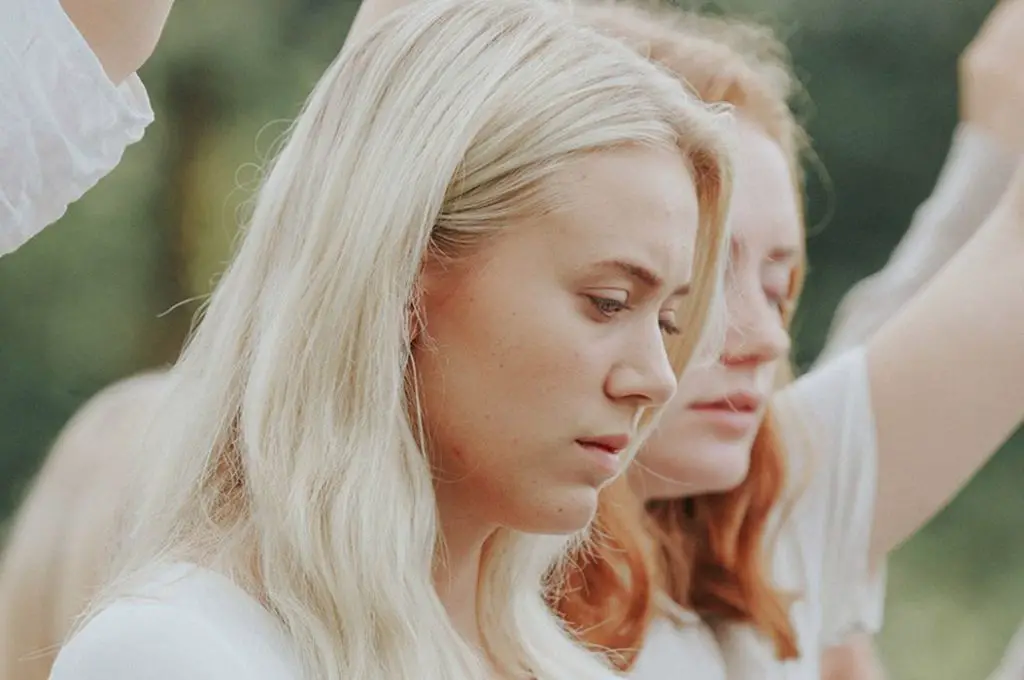Norwegian filmmaker Jorunn Myklebust Syversen has been emerging onto the world stage as a powerful voice in cinema. Her first feature film was Hoggerenin in 2017, and she now brings her new film Disco to TIFF. The film is a remarkable examination of the religious cult scene in Norway, with a thoughtful interplay of popular culture and traditional spiritual beliefs.
Wilson Kwong for Film Inquiry: Going through your filmography, you were initially doing a lot of short films before jumping into your first feature film Hoggerenin in 2017. Was that a big jump?
Jorunn Myklebust Syversen: It was actually really huge because when I started out in Norway, I worked with this video artist for many years. And after a while, I started working with small teams and made or produced my own short films, but I’d never worked on a large narrative. So that was a big leap, but it was really nice. I like feature films so much more because I think it has so much potential to speak about topics in a political way and in an extensive way. You use all your senses and it has so many layers.
Can you talk about what attracted you to the subject of religious cults?
Jorunn Myklebust Syversen: I think I’ve always been interested in closed environments and the imbalance of power. And I have no background in Christianity myself, but I was really fascinated by the congregations that sprung out of the Pentecostal church – with exorcisms and how some pastors were healing people with severe illnesses for money. So I wanted to look into that particular environment, and I just didn’t know there were modern churches that were more like pop concerts, which was really fascinating to me.
I had no idea that these churches actually existed in real life.
Jorunn Myklebust Syversen: They do exist, and there are a lot of similar congregations. Mine in the film [Freedom] is fiction, but based on research I did of real ones.
It was also really interesting how you incorporated dance into the film’s story. Where did that idea come from?
Jorunn Myklebust Syversen: I’ve actually been fascinated by this environment for about 10 years. I think it’s so wild with all these sexualized costumes and young women dancing, which I thought was so extreme. So then I thought it would be a nice contrast to see those extremes compared to those in Christianity. I also feel that on the surface, churches – especially the modern ones – are so liberal. They are talking about how everybody is welcome in our home and that you should come to us. But underneath that surface, many of them are interpreting the Bible word by word, so it’s really conservative. So it’s something about the symbol of what’s on the surface and what’s beneath.
So would you say that your film is primarily about religion or cults?
Jorunn Myklebust Syversen: For me, it’s about how people limit one another and force our own truths onto others. I’m especially interested in how this affects children and vulnerable people in vulnerable situations. So for me it’s not necessarily about faith itself, but the structures around faith and religion, which can be a curse in a way.
Something else I found really interesting was how rather than focusing solely on the cult or religion itself, the film looks more at how the main character is affected by her religious group, and her experience becomes the film’s focus. What kind of direction did you give Josefine Frida for this role?
Jorunn Myklebust Syversen: It was a really nice collaboration and we had an instant chemistry. We got to know each other really well and had the same vision for why we wanted to work on this film. She dove straight into the core of the project and it was really easy to write for her. I would imagine how she would be in certain situations as this is something I like to do when I write for people.
So it sounds like you had her in mind when you wrote the initial screenplay.
Jorunn Myklebust Syversen: Yes.
When the film is released in Norway, are you expecting to get any pushback or criticism from certain religious groups?
Jorunn Myklebust Syversen: The film comes out on the fourth of October, and we already have one reaction from one of these more extreme groups. And of course, I think there will be some strong reactions because I really tried to show this environment as authentically as I could. I’ve spoken to a lot of people who have left the church to understand it better, but it will always still be my interpretation. But I think it’s important to show this, especially when children are being brought up in an environment where they are not given any other option. For some Pentecostal churches or religious organizations, anyone can start their own church and it’s quite easy to get funding, and this is something I want to question because I find it problematic.
And who do you anticipate will be the target audience of this film?
Jorunn Myklebust Syversen: I definitely think that people who have had this kind of particular experience will watch the film, because there are so many people out there who have experienced the same thing. But I also think that the youth population in general or people who find themselves in difficult situations should watch it too.
Film Inquiry thanks Jorunn Myklebust Syversen for taking the time to speak with us.
Does content like this matter to you?
Become a Member and support film journalism. Unlock access to all of Film Inquiry`s great articles. Join a community of like-minded readers who are passionate about cinema - get access to our private members Network, give back to independent filmmakers, and more.
